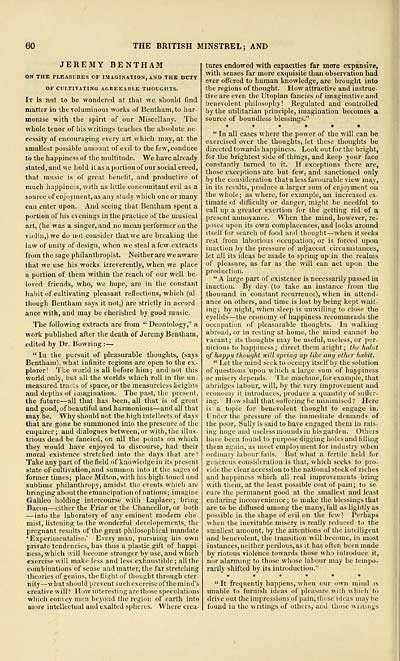Glen Collection of printed music > Printed music > British minstrel, and musical and literary miscellany
(68) Page 60
Download files
Complete book:
Individual page:
Thumbnail gallery: Grid view | List view

60
THE BRITISH MINSTREL; AND
JEREMY BENTHAM
ON THE PLEASURES OF IMAGINATION, AND THE DUTY
OF CULTIVATING AGREEABLE THOUGHTS.
It is not to be wondered at that we should find
matter in the voluminous works of Bentham,to har-
monise with the spirit of our Miscellany. The
whole tenor of his writings teaches the absolute ne.
cessity of encouraging every art which may, at the
smallest possible amount of evil to the few, conduce
to the happiness of the multitude. We have already
stated, and we hold it as a portion of our social creed,
that music is of great benefit, and productive of
much happiness, with as little concomitant evil as a
source of enjoyment, as any study which one or many
can enter upon. And seeing that Bentham spent a
portion of his evenings in the practice of the musical
art, (he was a singer, and no mean performer on the
violin,) we do not consider that we are breaking the
law of unity of design, when we steal a few extracts
from the sage philanthropist. Neither are we aware
that we use his works irreverently, when we place
a portion of them within the reach of our well be-
loved friends, who, we hope, are in the constant
habit of cultivating pleasant reflections, which (al-
though Bentham says it not,) are strictly in accord-
ance with, and may be cherished by good music.
The following extracts are from " Deontology," a
work published after the death of Jeremy Bentham,
edited by Dr. Bowring : —
" In the pursuit of pleasurable thoughts, (says
Bentham), what infinite regions are open to the ex-
plorer! The world is all before him; and not this
world only, but all the worlds which roll in the un-
measured tracts of space, or the measureless heights
and depths of imagination. The past, the present,
the future — all that has been, all that is of great
and good, of beautiful and harmonious — and all that
may be. Why should not the high intellects of days
that are gone be summoned into the presence of the
enquirer; and dialogues between,or with, the illus-
trious dead be fancied, on all the points on which
they would have enjoyed to discourse, had their
moral existence stretched into the days that are?
Take any part of the field of knowledge in its present
state of cultivation, and summon into it the sages of
former times; place Milton, with his high-toned and
subUme philanthropy, amidst the events which are
bringing aboutthe emancipation of nations; imagine
Galileo holding intercourse with Laplace; bring
Bacon — either the Friar or the Chancellor, or both
— into the laboratory of any eminent modern che-
mist, listening to the wonderful developements, the
pregnant results of the great philosophical mandate
'Experimentalise.' Everyman, pursuing his own
private tendencies, has thus a plastic gift of happi-
ness, which svill become stronger by use, and which
exercise will make less and less exhaustible ; all the
combinations of sense and matter, the far stretching
theories of genius, the flight of thought through eter-
nity — what should prevent such exercise of the mind's
creative will? How interesting are those speculations
which com ey men beyond the region of earth into
more intellectual and exalted spheres. Where crea-
tures endowed with capacities far more expansive,
with senses far more exquisite than observation had
ever ofl'cred to human knowledge, are brought into
the regions of thought. How attractive and instruc-
tive are even the Utopian fancies of imaginative and
benevolent philosophy! Regulated and controlled
by the utilitarian principle, imagination becomes a
source of boundless blessings."
" In all cases where the power of the will can be
exercised over the thoughts, let these thoughts be
directed towards happiness. Look out for the bright,
for the brightest side of things, and keep your face
constantly turned to it. If exceptions there are,
those exceptions are but few, and sanctioned only
by the consideration that a less favourable view may,
in its results, produce a larger sum of enjoyment on
the whole ; as where, for example, an increased es-
timate of difficulty or danger, might be needful to
call up a greater exertion for the getting rid of a
present annoyance. When the mind, however, re-
poses upon its own complacences, and looks around
itself for search of food and thought — when it seeks
rest from laborious occupation, or is forced upon
inaction by the pressure of adjacent circumstances,
let all its ideas be made to spring up in the realms
of pleasure, as far as the will can act upon the
production.
" A large part of existence is necessarily passed in
inaction. By day (to take an instance from the
thousand in constant recurrence), when in attend-
ance on others, and time is lost by being kept wait-
ing; by night, when sleep is unwilling to close the
eyelids — the economy of happiness recommends the
occupation of pleasurable thoughts. In walking
abroad, or in resting at home, the mind cannot be
vacant; its thoughts may be useful, useless, or per-
nicious to happiness; direct them aright ; the habit
of happy thijuf/ht n-ill spHnt/ iqt like any othvr habit.
" Let the mind seek to occupy itself by the solution
of questi(jns upon which a large sum of happiness
or misery depends. The machine, for example, that
abridges labour, will, by the very imjjrovement and
economy it introduces, produce a quantity of sutl'er-
ing. How shall that suffering be minimised? Here
is a topic for benevolent thought to engage in.
Under the pressure of the immediate demands of
the poor, Sully is said to have engaged them in rais-
ing huge and useless mounds in his garden. Otlicrs
have been found to purpose digging holes and filling
them again, as meet employment for industry when
ordinary labour fails. But what a fertile field for
generous consideration is that, which seeks to pro-
vide the clear accession to the national stock of riches
and happiness which all real improvements bring
with them, at the least possible cost of pain; to se-
cure the permanent good at the smallest and least
enduring inconvenience ; to make the blessings that
are to be diffused among the many, fall as lightly as
possible in the shape of evil on the few ! Perhaps
when the inevitable misery is really reduced to the
smallest amount, by the attentions of the intelligent
and benevolent, the transition will become, in most
instances, neither perilous, as it has often been made
by riotous violence towards those who introduce it,
nor alarming to those whose labour may be tempo-
rarily shifted by its introduction."
******
" It frequently happens, when our own mind is
unable to furnish ideas of pleasure with which to
drive out the impressions of pain, those ideas m;iy he
found in the writings of others, and those wrilniys
THE BRITISH MINSTREL; AND
JEREMY BENTHAM
ON THE PLEASURES OF IMAGINATION, AND THE DUTY
OF CULTIVATING AGREEABLE THOUGHTS.
It is not to be wondered at that we should find
matter in the voluminous works of Bentham,to har-
monise with the spirit of our Miscellany. The
whole tenor of his writings teaches the absolute ne.
cessity of encouraging every art which may, at the
smallest possible amount of evil to the few, conduce
to the happiness of the multitude. We have already
stated, and we hold it as a portion of our social creed,
that music is of great benefit, and productive of
much happiness, with as little concomitant evil as a
source of enjoyment, as any study which one or many
can enter upon. And seeing that Bentham spent a
portion of his evenings in the practice of the musical
art, (he was a singer, and no mean performer on the
violin,) we do not consider that we are breaking the
law of unity of design, when we steal a few extracts
from the sage philanthropist. Neither are we aware
that we use his works irreverently, when we place
a portion of them within the reach of our well be-
loved friends, who, we hope, are in the constant
habit of cultivating pleasant reflections, which (al-
though Bentham says it not,) are strictly in accord-
ance with, and may be cherished by good music.
The following extracts are from " Deontology," a
work published after the death of Jeremy Bentham,
edited by Dr. Bowring : —
" In the pursuit of pleasurable thoughts, (says
Bentham), what infinite regions are open to the ex-
plorer! The world is all before him; and not this
world only, but all the worlds which roll in the un-
measured tracts of space, or the measureless heights
and depths of imagination. The past, the present,
the future — all that has been, all that is of great
and good, of beautiful and harmonious — and all that
may be. Why should not the high intellects of days
that are gone be summoned into the presence of the
enquirer; and dialogues between,or with, the illus-
trious dead be fancied, on all the points on which
they would have enjoyed to discourse, had their
moral existence stretched into the days that are?
Take any part of the field of knowledge in its present
state of cultivation, and summon into it the sages of
former times; place Milton, with his high-toned and
subUme philanthropy, amidst the events which are
bringing aboutthe emancipation of nations; imagine
Galileo holding intercourse with Laplace; bring
Bacon — either the Friar or the Chancellor, or both
— into the laboratory of any eminent modern che-
mist, listening to the wonderful developements, the
pregnant results of the great philosophical mandate
'Experimentalise.' Everyman, pursuing his own
private tendencies, has thus a plastic gift of happi-
ness, which svill become stronger by use, and which
exercise will make less and less exhaustible ; all the
combinations of sense and matter, the far stretching
theories of genius, the flight of thought through eter-
nity — what should prevent such exercise of the mind's
creative will? How interesting are those speculations
which com ey men beyond the region of earth into
more intellectual and exalted spheres. Where crea-
tures endowed with capacities far more expansive,
with senses far more exquisite than observation had
ever ofl'cred to human knowledge, are brought into
the regions of thought. How attractive and instruc-
tive are even the Utopian fancies of imaginative and
benevolent philosophy! Regulated and controlled
by the utilitarian principle, imagination becomes a
source of boundless blessings."
" In all cases where the power of the will can be
exercised over the thoughts, let these thoughts be
directed towards happiness. Look out for the bright,
for the brightest side of things, and keep your face
constantly turned to it. If exceptions there are,
those exceptions are but few, and sanctioned only
by the consideration that a less favourable view may,
in its results, produce a larger sum of enjoyment on
the whole ; as where, for example, an increased es-
timate of difficulty or danger, might be needful to
call up a greater exertion for the getting rid of a
present annoyance. When the mind, however, re-
poses upon its own complacences, and looks around
itself for search of food and thought — when it seeks
rest from laborious occupation, or is forced upon
inaction by the pressure of adjacent circumstances,
let all its ideas be made to spring up in the realms
of pleasure, as far as the will can act upon the
production.
" A large part of existence is necessarily passed in
inaction. By day (to take an instance from the
thousand in constant recurrence), when in attend-
ance on others, and time is lost by being kept wait-
ing; by night, when sleep is unwilling to close the
eyelids — the economy of happiness recommends the
occupation of pleasurable thoughts. In walking
abroad, or in resting at home, the mind cannot be
vacant; its thoughts may be useful, useless, or per-
nicious to happiness; direct them aright ; the habit
of happy thijuf/ht n-ill spHnt/ iqt like any othvr habit.
" Let the mind seek to occupy itself by the solution
of questi(jns upon which a large sum of happiness
or misery depends. The machine, for example, that
abridges labour, will, by the very imjjrovement and
economy it introduces, produce a quantity of sutl'er-
ing. How shall that suffering be minimised? Here
is a topic for benevolent thought to engage in.
Under the pressure of the immediate demands of
the poor, Sully is said to have engaged them in rais-
ing huge and useless mounds in his garden. Otlicrs
have been found to purpose digging holes and filling
them again, as meet employment for industry when
ordinary labour fails. But what a fertile field for
generous consideration is that, which seeks to pro-
vide the clear accession to the national stock of riches
and happiness which all real improvements bring
with them, at the least possible cost of pain; to se-
cure the permanent good at the smallest and least
enduring inconvenience ; to make the blessings that
are to be diffused among the many, fall as lightly as
possible in the shape of evil on the few ! Perhaps
when the inevitable misery is really reduced to the
smallest amount, by the attentions of the intelligent
and benevolent, the transition will become, in most
instances, neither perilous, as it has often been made
by riotous violence towards those who introduce it,
nor alarming to those whose labour may be tempo-
rarily shifted by its introduction."
******
" It frequently happens, when our own mind is
unable to furnish ideas of pleasure with which to
drive out the impressions of pain, those ideas m;iy he
found in the writings of others, and those wrilniys
Set display mode to: Large image | Transcription
Images and transcriptions on this page, including medium image downloads, may be used under the Creative Commons Attribution 4.0 International Licence unless otherwise stated. ![]()
| Special collections of printed music > Glen Collection of printed music > Printed music > British minstrel, and musical and literary miscellany > (68) Page 60 |
|---|
| Permanent URL | https://digital.nls.uk/91435761 |
|---|
| Description | Scottish songs and music of the 18th and early 19th centuries, including music for the Highland bagpipe. These are selected items from the collection of John Glen (1833 to 1904). Also includes a few manuscripts, some treatises, and other books on the subject. |
|---|
| Description | The Glen Collection and the Inglis Collection represent mainly 18th and 19th century Scottish music, including Scottish songs. The collections of Berlioz and Verdi collected by bibliographer Cecil Hopkinson contain contemporary and later editions of the works of the two composers Berlioz and Verdi. |
|---|

